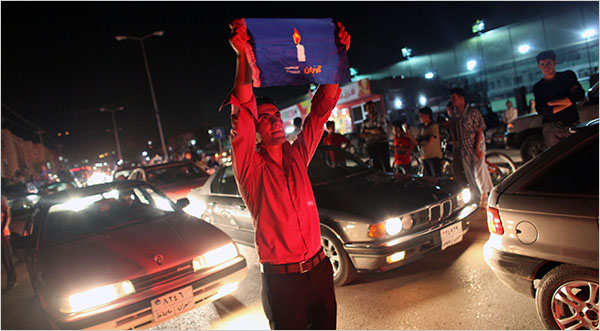
The Gorran Movement – A Change in the Iraqi Kurdish Political Landscape
Publication: Terrorism Monitor Volume: 8 Issue: 13
By:

The emergence of a new Kurdish opposition movement in Iraqi Kurdistan—Gorran (meaning “Change”)—has complicated the political landscape of northern Iraq. A break-away movement of many top PUK (Patriotic Union of Kurdistan) members founded in February 2009, Gorran won 25 of 111 seats in the Kurdish provincial elections of July 2009. The two previously dominant parties, the PUK and the KDP (Kurdistan Democratic Party) won most of the remaining seats in that election. Gorran campaigned on a platform of reducing the dominant parties’ corruption, nepotism and “1930s Chicago-style big party politics” in the region. [1]
In the March 7 nation-wide Iraqi elections, Gorran ran on a separate slate from the KDP-PUK Kurdistan Alliance List. According to final results released by the Iraqi High Electoral Commission on March 26, Gorran won 8 parliamentary seats to the Kurdistan List’s 43, winning almost half the vote in the PUK stronghold of Sulaymaniya and two seats in Erbil, but faring poorly in Kirkuk, Duhok, Ninawa (Mosul) and Diyala. [2]
Kurdish media complained that Gorran and two smaller Kurdish Islamist lists split the vote in this election, leading to the Kurds’ loss of up to six seats in the new Iraqi Parliament (Rudaw.net; March 15). If a list’s vote tally in this latest election failed to meet the threshold for a parliamentary seat in a certain province (as opposed to nationwide in the 2005 election), those votes were lost. In the case of disputed territories like Kirkuk, this led to the loss of some 98,000 Kurdish votes, according to Ja’afer Iminki, the head of the KDP’s election office. [3] As a result, Iyad Allawi’s Iraqiya list appears to have emerged with the most votes in Kirkuk, despite a majority of that province’s electorate voting for the different Kurdish lists. When Jamestown asked Gorran deputy leader Mohamad Tofiq about the issue, he responded “What is 6 seats in a parliament of 325? The Kurds will have a total of maybe 60 seats in the new parliament.” [4]
The new divisions within the Kurdish front, as well as a smattering of violent confrontations between Gorran and PUK supporters during the last year, has sparked speculation regarding stability in Iraqi Kurdistan and the Kurds’ ability to pursue their goals vis-à-vis Baghdad (Kurdish Aspect, December 31, 2009). [5] Gorran has also complained of intimidation and harassment from the PUK. The possibility of Nuri al-Maliki or other non-Kurdish political blocs bringing Gorran and the smaller Kurdish Islamist parties into a coalition government that leaves out the KDP-PUK Kurdistan Alliance List thus exists.
The chance of this happening, as well as the threat to Iraqi Kurdistan’s stability, does not appear to be great, however. Both high Kurdistan Regional Government (KRG) officials and Gorran leaders told Jamestown that on issues of core interest to the Kurds, a united front will continue to exist. Falah Mustafa Bakir, the head of the KRG’s Foreign Relations Office, observed that Gorran’s focus is on administration of the KRG, budget issues, and other questions of governance. “In any dispute between Baghdad and the KRG, we have one voice – it’s a national identity issue.” [6] Gorran Deputy Leader Mohamad Tofiq likewise told Jamestown that “We can agree on a unified front for issues important to the region.” [7] He added, however, that “On other issues of importance to any Iraqi, we can pursue a different policy from that of the KDP and PUK. Not everything is a Kurdish issue. It is important for Iraqis to see that you have concerns on issues of importance to the whole country.” Tofiq does not, however, rule out the possibility of joining an Iraqi government without the Kurdistan Alliance. According to Tofiq, joining a coalition government depends on the nature of that government, on the solutions they propose for Kurdish concerns, and not on whether or not the KDP and PUK are present. “We competed against them. This wasn’t so we could follow their orders in a coalition.”
If Gorran were to join a new government in Baghdad that does not include the KDP and PUK it would open itself up to accusations of selling out Kurdish national interests, especially if it failed to quickly secure significant progress on Kurdish claims over Kirkuk and other disputed territories, an oil law and revenue sharing between the KRG and Baghdad. Immediately after the March 7 elections, leaders of al-Maliki’s State of Law slate and Allawi’s Iraqiyya bloc raced up to Kurdistan to sound out Kurdish leaders about the next coalition government, but they did not meet with the Gorran Movement. Gorran has not articulated preferences on core interests of Kurdistan (disputed territory, oil, peshmerga forces vis-à-vis Baghdad, and federalism) that differ from those of the KDP and PUK. In the latest election, its discussion of these questions focused on the KDP and PUK’s failure to secure progress on these issues rather than the goals themselves.
The possibility of significant instability in Iraqi Kurdistan also appears remote. Unlike most Kurdish political parties of the past, Gorran does not have an armed militia, and leaders insist, “We will never have a militia – the Kurdish people are tired of militias and conflict” [8] Iraqi Kurdistan’s institutions, which have had to develop since 1991, should prove able to handle a new opposition party. Gorran’s emergence is healthy for the democratic system, at least in the traditionally PUK-dominated part of Kurdistan. Gorran’s splintering from the PUK leaves the KDP relatively dominant in its part of the region, however, and perhaps eventually in need of some healthy opposition as well.
Notes:
1. Jamestown interview with Gorran Deputy Leader Mohamad Tofiq, Suleimaniya, March 20, 2010..
2. https://www.themajlis.org/projects/iraq-results; https://al-shorfa.com/cocoon/meii/xhtml/en_GB/features/meii/features/main/2010/03/27/feature-01.
3.Ibid. According to preliminary election results, however, the author estimates the number of “lost” Kurdish votes in Kirkuk to actually be closer to 45,000, with another 50,000 votes dissipated between the three smaller Kurdish lists in Niniwa, Diyala, Salaheddin and Baghdad.
4. Author’s interview with Mohamad Tofiq, March 20, 2010.
5. Wladimir van Wilgenburg interview with Lahur Talabani, Rudaw.net, March 5, 2010. See also Terrorism Monitor, March 11, 2010.
6. Author’s Interview with Falah Mustafa Bakir, Erbil, March 16, 2010.
7. Author’s interview with Mohamad Tofiq, March 20, 2010.
8. Ibid




